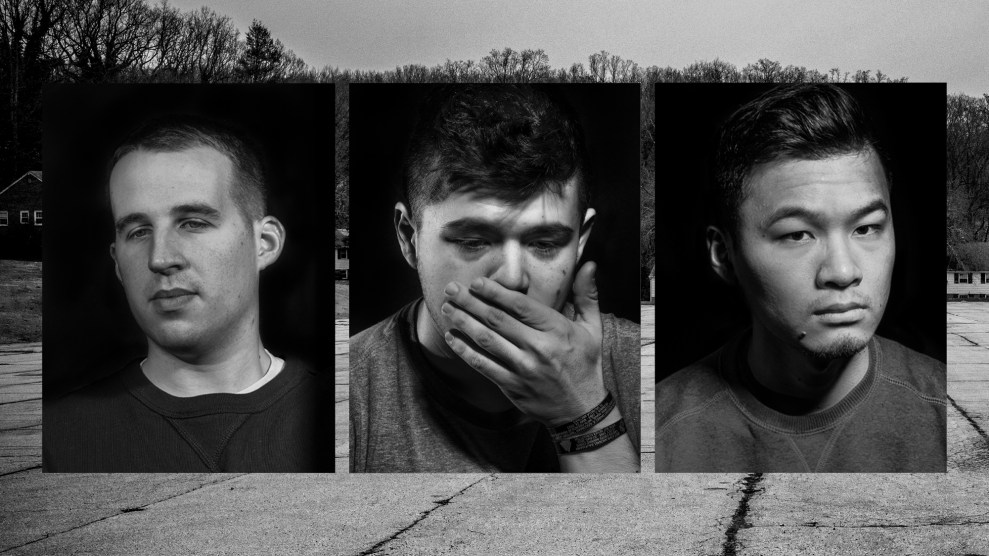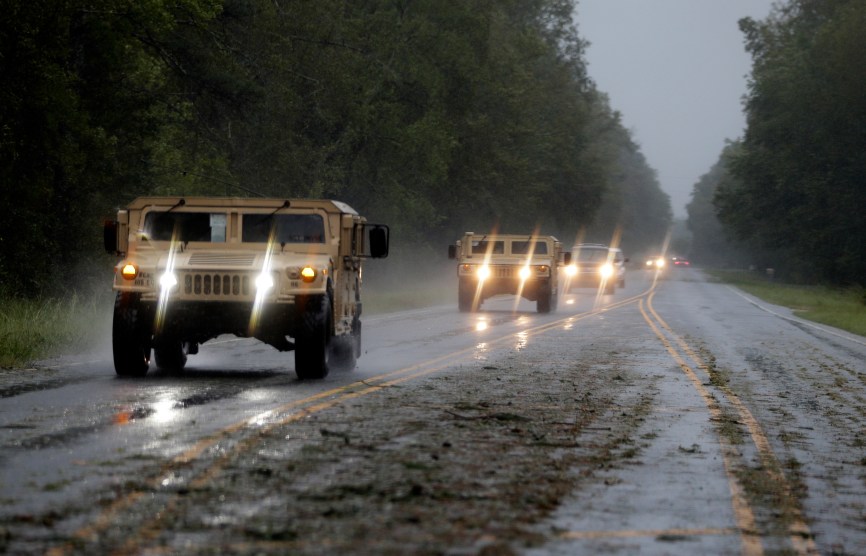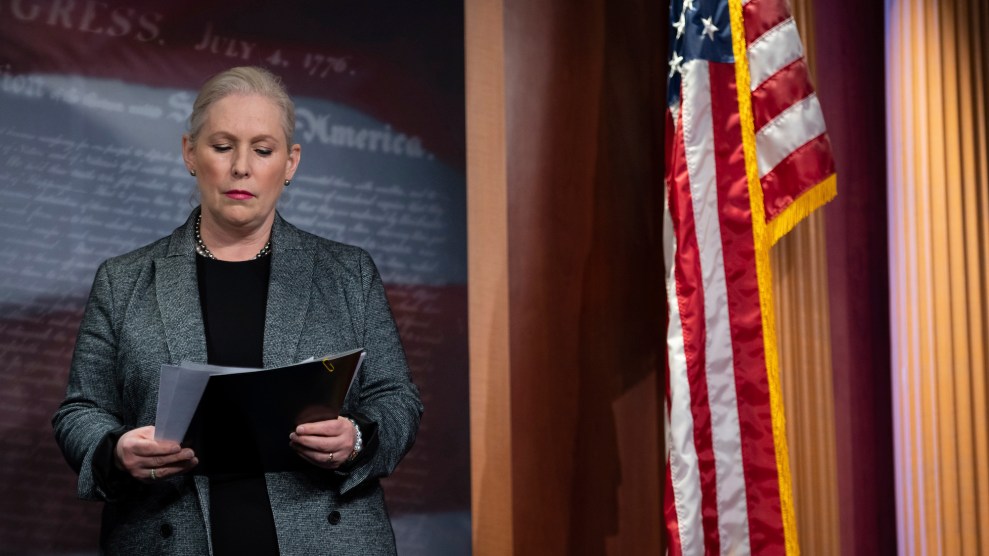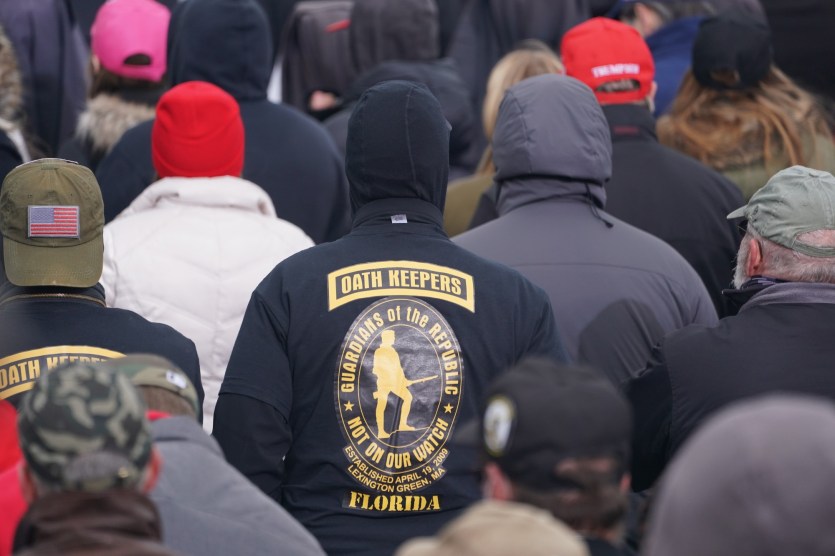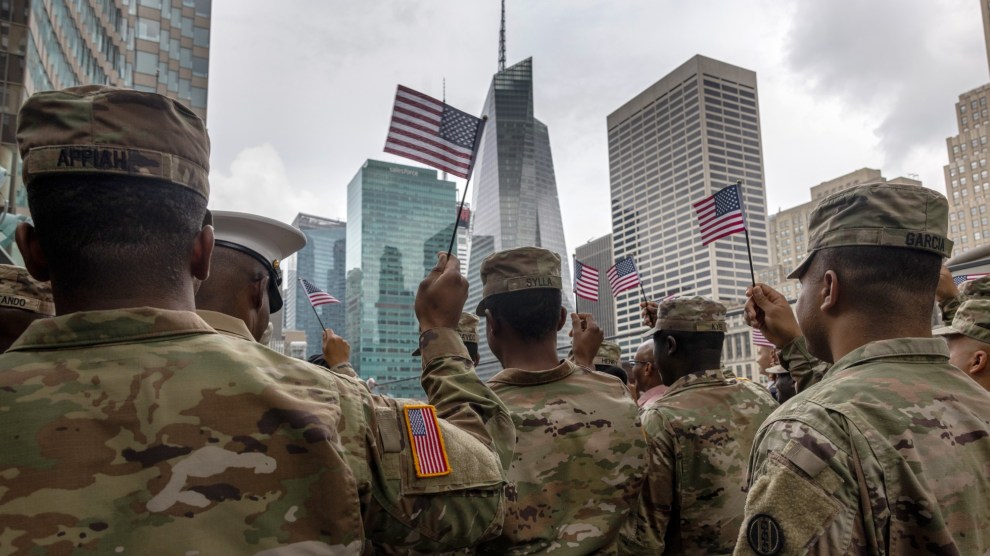
US Army soldiers pose for a group shot after becoming American citizens at a naturalization ceremony in New York City. John Moore/Getty
Immigrant soldiers have served in every significant US conflict since the Revolutionary War, but their presence in the military is often overlooked. When sociologist Sofya Aptekar went searching for immigrant veterans to interview for her new book, Green Card Soldier: Between Model Immigrant and Security Threat, many workers in veteran support offices told her they didn’t exist. “People didn’t understand that you could be in the US military without being a US citizen,” she told me.
In fact, about 7,000 people with green cards join the military each year, according to the Department of Defense. The Immigration and Nationality Act even provides a more streamlined path to citizenship for those who enlist, although even that has become a bureaucratic purgatory for many immigrant soldiers thanks to policy changes that have made the pursuit of citizenship more difficult in the last two decades.
In her book, Aptekar, an associate professor of urban studies at the City University of New York, takes a closer look at the experience of these “green card soldiers”—immigrants in the US military who have lawful permanent residency. Immigrants enlist in the military for many of the same reasons that American-born citizens do, she writes: patriotic duty, a longing for adventure, the desire to embody some sort of masculine ideal, and a lack of employment and educational opportunities. But for many immigrants, military service has additional layers of meaning. Some see enlistment as the height of belonging: a way to integrate, establish their eligibility for citizenship, and demonstrate their allegiance to a country that sees them as owing it a debt. In 2015, for example, Congressman Ruben Gallego (D-Ariz.), who was advocating for a defense bill amendment that would allow for undocumented youth to enlist in the military, spoke about how these immigrants should “have the opportunity to serve and repay their country.”
Although the amendment ultimately did not pass, this sense that immigrants are indebted to their country has persisted, and it’s one of many issues covered in Aptekar’s book. I spoke to her to learn more about the unique problems immigrant military workers face. Our interview has been edited and condensed for clarity.
Can you tell me more about the history of immigrants in the US military?
The United States has been in a conflict or hostility of some sort in every year of its existence. And every year, there have been immigrants—who are noncitizens, not just naturalized immigrants—who’ve fought in all the wars, from helping to take over Indigenous land to putting down slave rebellions. Immigrants were there on both sides of the Civil War. One interesting thing is, there were immigrants who were drafted into the US military. and there used to be mass naturalizations of them all in the 20th century, in World War I and World War II. Some people have said, well, citizenship should be automatic for immigrants who serve in the military today, and I argue against that in my book, because I’ve talked to immigrants who don’t necessarily even want to be US citizens.
What was the purpose of mass naturalizations? And which immigrants actually became citizens?
I mean, it helped that they were mostly European at the time, right? But the US also has a long history of using citizenship for geopolitical purposes. Part of the reason Puerto Ricans got US citizenship in 1917 was so they could all be eligible to be drafted for World War II. And in a lot of conflicts the US military was engaged in during the 19th century, and even earlier, they recruited immigrants into the military. Drafts are often unpopular for everybody, but by attracting more impoverished, racialized groups of people into the military—noncitizens, that is—you may have enough military workers to avoid a draft. That’s happened on multiple occasions in US history. It’s important to note that despite this, Asian immigrants, even the ones who served in the US military, were still excluded from mass naturalizations because there were laws in the books that did not allow foreign agents to become US citizens at the same time. So, it was, of course, a policy that benefited white, European immigrants.
Can you tell me more about the conflicting political narratives surrounding immigrants in the US military?
That’s what a lot of the book is about—it’s a reflection of the bifurcated narratives about immigrants in our society at large. There are positive narratives that focus on immigrant accomplishments and immigrants working hard to “get the job done.” And, of course, there’s also plenty of anti-immigrant discourse—you know, that they abuse social services and are criminals.
We see some of that playing out in the military. Some—the kind of immigrants who have served in the military, especially those who have been killed during combat—are used as proof that immigrants are deserving of rights. You can point to them and say, these immigrants aren’t even citizens yet, and they’re willing to sacrifice their lives for America and American freedoms. A very strong undercurrent of this can be found within some immigrant rights movements as well.
But the military talks about the skills that immigrants bring that they need: They speak the language, and they’re familiar with the cultures in the many places that the US military is based around the world. Immigrants also have lower rates of dropping out before their contract is over. That’s kind of the positive discourse, but just like in society at large, there’s a perpetual suspicion of immigrants. In the military, it’s heightened. These are foreigners. They’re not citizens and not born in the United States. Depending on how they’re racialized, people really face suspicion in their military work lives as potentially being spies. For Muslim immigrants that serve in the US military, that’s very powerful, as well as for Asian immigrants, particularly Chinese immigrants.
And it doesn’t fall neatly along party lines. For example, a lot of people are surprised that the Department of Defense is a consistent advocate for the DREAM Act. People assume the Department of Defense is associated more with conservative Republicans, but they currently have a recruitment shortage and would love to have a route for someone to serve in the military and get US citizenship, which is going to open up a vast pool of people for them to recruit from.
You write that immigrant soldiers can help legitimize the military. What does that mean?
Yes. Along those lines, when you have a diverse group of immigrants, you can say, look, these people are not even Americans yet, and they love America so much. They’re willing to die for the country to protect it. That’s super powerful. There are hundreds upon hundreds of US bases around the world, and lots of people in different countries are really angry about them. If you look at public opinions of the US military across the world, it’s not good. In response, the military can point to how immigrants from all over the world are knocking on our doors to let them serve. There’s even a movement by undocumented youth whose slogans repeat: “Let us serve.” That’s very powerful, rhetorically, to be able to point to that—it legitimizes American imperialism.
For some immigrants, joining the military may feel like their only choice. Can you tell me a little bit more about why that is?
It’s important to keep in mind that people do have agency. But we’re also constrained by the society that we live in, which channels an enormous amount of resources into three things: securitization, war, and surveillance, at the cost of other things that people need to survive. Even just growing up in a working-class neighborhood of color, you might have JROTC in your school, or you might be going to a military charter school, and you’re bombarded by military recruitment and marketing. For those who wanted to go to college but didn’t have the resources, this was how they thought they could go. And that’s not unique to immigrants, but it may be exacerbated for some immigrants because they might not have generational wealth.
I remember one story of a young woman from Pakistan whose brother was in deportation proceedings and her family had limited money, and they spent all the money they had to try to save him from being deported. She’s trying to go to community college and works at a gas station at the same time, so she goes to a recruiter’s office and takes the job with the highest recruitment bonus because her family needs to pay off those debts that they had from her brother’s deportation proceedings. Is that a choice? It’s a very constrained one.
In your book, you use the term “the poverty draft” to describe this phenomenon. Can you explain that term?
We don’t have a real draft right now like we did during Vietnam. But what we increasingly have is a “poverty draft.” Impoverishment pushes people into the military as an option that will bring a steady paycheck, with benefits and health care. And it is heavily marketed to us in low-income communities. Immigrants in particular may join the military to speed up the process of assimilating into American society. One person I interviewed was from Kenya, and he told me, when he’s in uniform, it’s the only time he experienced being treated as an American. It also really bothered him that it was only when he was in uniform that happened. Otherwise, he faced so much stigma and discrimination as an African man.
What are some of the psychological scars that immigrants sustain from engaging in what you call the “pervasive violence of military work”?
Yeah, and I want to start by saying that the damage isn’t just psychological. The damage to the body is also very striking. It came out in almost every interview, unprompted, where people would tell me about the extensive injuries to their bodies that they sustained. And a lot of them were younger than me, but were just physically in very bad shape, without actually being in combat. They’re just treated as expendable and their bodies used as tools by the military.
The psychological damage must be put in perspective with the damage that the US military does across the world in terms of just destroying lives and communities, and as you know, polluting the planet. In many cases that I saw, to fit in as an immigrant, as a racialized person, as a woman or queer person into these very rigid hierarchies that are profoundly shaped by patriarchy and white supremacy, requires the type of moral compromising and bending of your humanity, into impossible shapes. One extreme situation that illustrates this, which I describe in the opening of my book, involves an immigrant soldier experiencing the anticipation of having to point a gun at a fellow migrant crossing the border.
Undocumented immigrants can’t currently join the armed forces, but you write that the DOD would like to see that change. Why does the military see undocumented youth as more attractive recruits?
The reason that undocumented immigrant youth are attractive recruits, and I think that the reason the DOD is consistently supporting something like a DREAM Act, is that their citizenship would be tied to their service. They would be beholden to the military in order to get American citizenship. If you’re tying someone’s path to citizenship to completing the terms of their contract, you’re creating a compliant military worker who is going to do what you tell them to do and is potentially not going to complain about sexual harassment, racial discrimination, or what the military is doing around the world or having them do. Citizenship becomes a way to regulate immigrants’ military labor, like holding a giant carrot in front of them. It creates, just like other immigrant workplaces in the United States, a situation where somebody’s status is tied to their employer, and that creates an extra-exploitative atmosphere.
And why is military service seen as a way for immigrants to “repay the United States”?
Yeah, that’s a very strong undercurrent. It’s the story of immigrants being in debt to the United States because they’ve been given access to the American dream. You’re not allowed just to be human and live your own life, but you have to, as an immigrant, prove you are worthy of entry into America. And so military service, for immigrants, is often framed as the repayment of that debt. To the extent that immigrants can ever repay this debt, it really is impossible if you don’t look like you’re from the United States. And I think one of the things I’m trying to do with the book is to really push against those narratives not just with conservatives, but among liberals, immigrant rights movements, and within migrant justice advocacy. It’s a mistake we can’t just attribute to Republicans.
Fighting for the inclusion of immigrants in the military or better treatment of immigrants in the military is not quite addressing the elephant in the room for me, which is what the US military itself does and exists for. I think it’s a bad move by liberals to emphasize this kind of right of access to the military for immigrants and is something that we should question more broadly. That’s the purpose of this book. In the world I want to live in, there is no US military.
